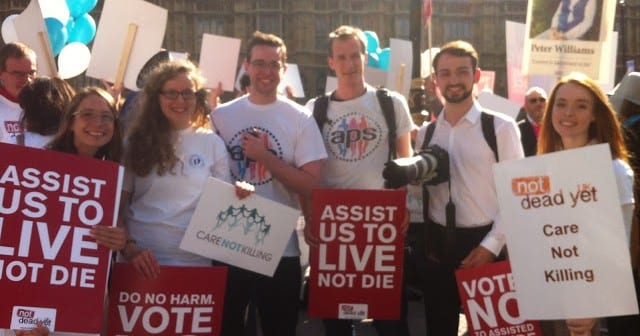The Alliance of Pro-Life Students (APS), an organization that unites Pro-Life student groups across Great Britain, showed great dedication to opposing Wales’ Marris Bill, which threatened to legalize assisted suicide last week. The bill was soundly defeated by a Welsh Parliamentary vote of 118-330 on Friday, as Pro-Lifers and disability advocates exhaled a sigh of relief.
Palliative care consultant Baroness Ilora Finlay, an opponent of the Marris Bill, called attention to the problem of assessing a terminally ill person’s lifespan. “You can’t predict how long people will live,” she told Wales’ ITV. Baroness Finlay outlined her concerns with the bill in a June Huffington Post op-ed, pointing out that there have already been abuses of the law in Oregon (the state whose assisted suicide law serves as a prototype nationally and internationally):
The campaigners tell us not to worry. The pressure group Dignity in Dying, formerly the Voluntary Euthanasia Society, says that in Oregon “there have been no cases of abuse and no calls to extend the law beyond terminally ill adults.” In reality, there are no arrangements in place to scrutinise how requests for assisted suicide are being handled – whether the doctors who agree to consider them are conducting serious enquiries or just ticking the boxes. What we do know, from research carried out in Oregon is that some people who have ended their lives with legally-supplied lethal drugs had been suffering from undiagnosed clinical depression.
Pro-Life student Greg Jackson, the Student Support Officer for APS, spoke to Welsh news about the dangers of the bill, calling the defeated legislation “discriminatory:”
The major problem of this sort of legislation, no matter how restrictive it is, is it creates two different classes of people. It says, for most people, “Well, if you want to commit suicide we’re going to try and stop you doing that because we don’t think that’s a good thing. However, there’s a separate class of people – in this case, people who are terminally ill – it says, you belong to a different class. Whereas usually you wouldn’t be encouraged to commit suicide, but if you want to do it, that’s fine.” And this is discriminatory legislation.
Assisted suicide campaigners tend to overlook the innate problems in assisted suicide legislation (that such bills create a discriminatory dichotomy among the population, and that they lead to more and more devaluing legislative decisions in what has been called the “slippery slope” of assisted suicide). Instead, advocates insist that assisted suicide is a “compassionate” choice. Greg Judge, who campaigned in favor of the bill, said that he believes bills mirroring the Marris Bill will be reintroduced until the assisted suicide community sees success: “It’s not a case of if; it’s a case of when terminally ill people have the choice to end their life.”
We hope Alliance of Pro-Life Students continue their work to educate people about truly compassionate choices in end of Life care.

